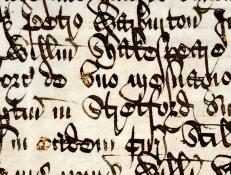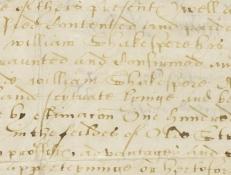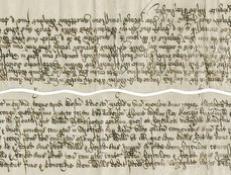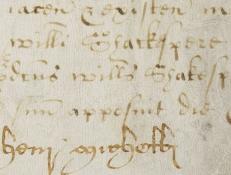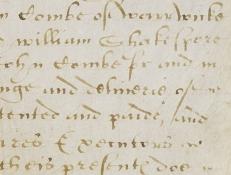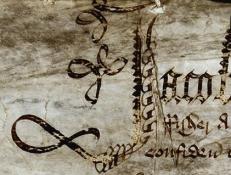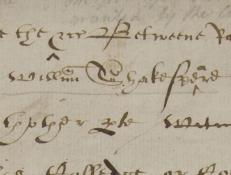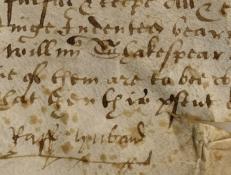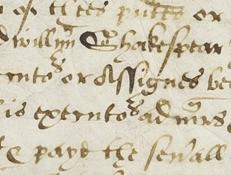Shakespeare purchased New Place, one of the largest houses in Stratford-upon-Avon, from William Underhill in 1597. He also purchased other properties, including one in London near the Blackfriars playhouse--the indoor theater where his acting company performed. The Blackfriars gatehouse, purchased from Henry Walker in 1613, may have been an investment by the business-savvy Shakespeare or a convenient London residence. This section includes documents relating to these two purchases, and to many other purchases as well.
All Documents
1602
This is the foot of fine, one of the three copies of the final concord ratifying Shakespeare’s purchase of New Place in 1602. It has been filed with other Warwickshire “feet” among the records of the Court of Common Pleas since 1602.
May 1, 1602
John Combe was a wealthy member of a family settled in Stratford since the 1530s. In 1593 he had acquired these 107 acres of land from Rice Griffin, with his equally wealthy uncle and lawyer, William Combe of Warwick, apparently acting in the capacity of trustee.
1602
These two documents are the buyer's and vendor's copies of the 1602 final concord for Shakespeare's purchase of New Place. Shakespeare purchased New Place, one of the largest houses in Stratford-upon-Avon, from William Underhill in 1597.
September 28, 1602
Shortly after his purchase of land from the Combes, a major investment, Shakespeare acquired a cottage and a quarter acre of land in Chapel Lane, to be held by a form of tenure known as copyhold.
May 1, 1602
In 1602 William Shakespeare negotiated with John Combe for the purchase of 107 acres for £320, a considerable sum. Two copies were made of the deed conveying this land.
1602
SHAKESPEARE DOCUMENTED IS STILL GROWING! Descriptive content and transcriptions will continue to be added, updated and expanded. Check back for regular updates!
October 24, 1604
SHAKESPEARE DOCUMENTED IS STILL GROWING! Descriptive content and transcriptions will continue to be added, updated and expanded. Check back for regular updates!
July 24, 1605
An attorney would have initially drafted the deed conveying the lease of half the Stratford tithes to Shakespeare, before a clerk or scrivener engrossed the final copy.
July 24, 1605
It was customary for a vendor to enter into a bond on the same day that a conveyance (or similar document) was signed, in order to ensure his or her performance of any covenants that the main deed contained.
July 24, 1605
In the summer of 1605, by means of the deed shown here, Shakespeare was able to raise the very considerable sum of £440 to purchase from Ralph Hubaud a half-share in a lease of a portion of the Stratford tithes.

